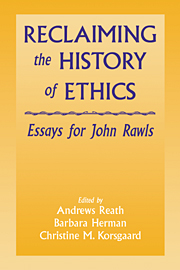Book contents
- Frontmatter
- Contents
- List of Contributors
- Introduction
- Aristotle on the Soul's Conflicts: Toward an Understanding of Virtue Ethics
- Coercion, Ideology, and Education in Hobbes's Leviathan
- The Hobbesian Side of Hume
- The Natural Goodness of Humanity
- Metaphysics, Philosophy: Rousseau on the Problem of Evil
- Within the Limits of Reason
- A Cosmopolitan Kingdom of Ends
- Legislating for a Realm of Ends: The Social Dimension of Autonomy
- Kant on the Objectivity of the Moral Law
- Kantian Virtue: Priggish or Passional?
- Taking the Law into Our Own Hands: Kant on the Right to Revolution
- Kant on Aesthetic and Biological Purposiveness
- Kant on Ends and the Meaning of Life
- Community and Completion
Community and Completion
Published online by Cambridge University Press: 04 November 2009
- Frontmatter
- Contents
- List of Contributors
- Introduction
- Aristotle on the Soul's Conflicts: Toward an Understanding of Virtue Ethics
- Coercion, Ideology, and Education in Hobbes's Leviathan
- The Hobbesian Side of Hume
- The Natural Goodness of Humanity
- Metaphysics, Philosophy: Rousseau on the Problem of Evil
- Within the Limits of Reason
- A Cosmopolitan Kingdom of Ends
- Legislating for a Realm of Ends: The Social Dimension of Autonomy
- Kant on the Objectivity of the Moral Law
- Kantian Virtue: Priggish or Passional?
- Taking the Law into Our Own Hands: Kant on the Right to Revolution
- Kant on Aesthetic and Biological Purposiveness
- Kant on Ends and the Meaning of Life
- Community and Completion
Summary
Community is what takes place always through others and for others.
Jean-Luc Nancy, The Inoperative CommunityFor over a decade – say, since Michael Sandel's Liberalism and the Limits of Justice – communitarians have attacked John Rawls's theory of justice as fairness. Yet communitarian writers have said almost nothing about what kind or kinds of relationships among citizens or between citizens and the state a communitarian should advocate. In this essay I sketch a picture of communal relationships and use it to examine the nature of community in Rawls's work. In the first section I extract a picture of communal relationships from Karl Marx's 1844 Comments on James Mill, Élémens d'économie politique; in the second section I argue for this picture's distinctiveness; finally, in the last section I look at a shift in the nature of community between A Theory of Justice and Rawls's more recent book, Political Liberalism. In that last section I argue that a picture structurally similar to that in Marx is exhibited by the well-ordered society of Theory, although not by that of Political Liberalism. In the end the communitarian charge – that Rawls's view is at odds with an emphasis on community – turns out to be legitimate, but not with respect to Theory, the standard communitarian target. However, seeing this depends on seeing the possibility of different conceptions of community. And that points to the need for development of and debate about such conceptions. My larger goal is to take a step toward such development and debate.
1. “Suppose,” Marx says in the Comments, “we had carried out production as human beings. Each of us would have doubly affirmed himself and the other person.”
- Type
- Chapter
- Information
- Reclaiming the History of EthicsEssays for John Rawls, pp. 388 - 418Publisher: Cambridge University PressPrint publication year: 1997
- 4
- Cited by



